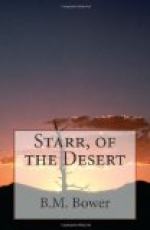Luis finished the song, strummed a while, sang a popular rag-time, strummed again and, so Starr explained his silence, went to bed. Estan began again to talk, now and then lifting his voice, speaking earnestly, as though he was arguing or protesting, or perhaps expounding a theory of some sort. Starr could not catch the words, though he knew in a general way the meaning of the tones Estan was using.
A new sound brought him to his knees, listening: the sound of a high-powered engine being thrown into low gear and buzzing like angry hornets because the wheels did not at once grip and thrust the car forward. Sand would do that. While Starr listened, he heard the chuckle of the car getting under way, and a subdued purring so faint that, had there not been a slow, quiet breeze from that direction, the sound would never have reached his ears at all. Even so, he had no more than identified it when the silence flowed in and covered it as a lazy tide covers a pebble in the moist sand.
Starr glanced down at the house, heard Estan still talking, and got carefully to his feet. He thought he knew where the car had slipped in the sand, and he made toward the place as quickly as he could go in the dark and still keep his movements quiet. It was back in that arroyo where he had first discovered traces of the car he now felt sure had come from the yard of Las Nuevas.
He remembered that on the side next him the arroyo had deep-cut banks that might get him a nasty fall if he attempted them in the dark, so he took a little more time for the trip and kept to the rougher, yet safer, granite-covered ridge. Once, just once, he caught the glow of dimmed headlights falling on the slope farthest from him. He hurried faster, after that, and so he climbed down into the arroyo at last, near the point where he had climbed out of it that other day.
He went, as straight as he could go in the dark, to the place where he had first seen the tracks of the Silvertown cords. He listened, straining his ears to catch the smallest sound. A cricket fiddled stridently, but there was nothing else.
Starr took a chance and searched the ground with a pocket flashlight. He did not find any fresh tracks, however. And while he was standing in the dark considering how the hills might have carried the sound deceptively to his ear, and how he may have been mistaken, from somewhere on the other side of the ridge came the abrupt report of a gun. The sound was muffled by the distance, yet it was unmistakable. Starr listened, heard no second shot, and ran back up the rocky gulch that led to the ridge he had just left, behind Medina’s house.
He was puffing when he reached the place where he had lain between the two boulders, and he stopped there to listen again. It came,—the sound he instinctively expected, yet dreaded to hear; the sound of a woman’s high-keyed wailing.




